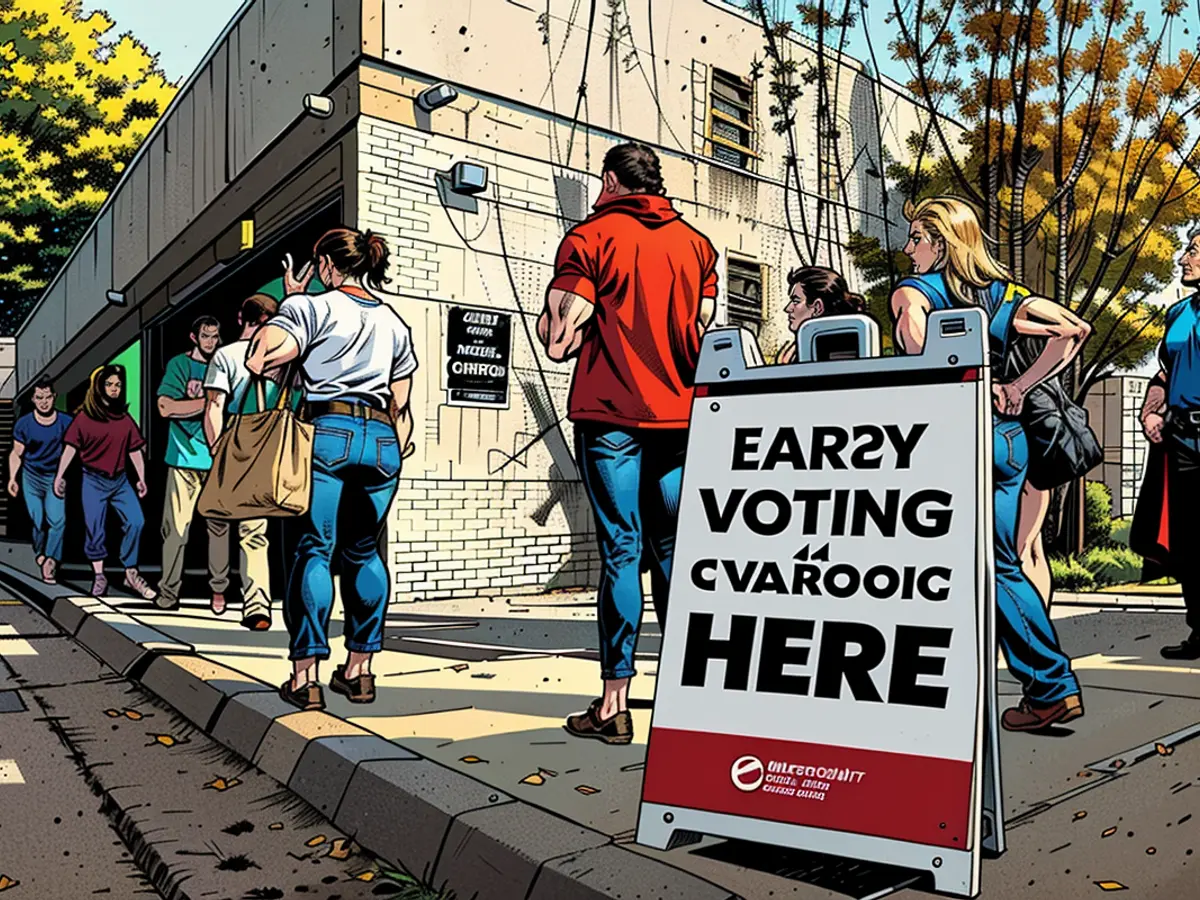Understanding early voting procedures in Georgia and North Carolina
Amidst a barrage of legislative reforms and the aftermath of Hurricane Helene, the voting experience might differ for numerous voters approaching the polls in the forthcoming weeks.
In Georgia, voters can commence casting their ballots from Tuesday onwards, while early in-person voting commences in North Carolina on Thursday. A few essential insights about the voting and election mechanics in these pivotal swing states are provided below.
Georgia
Minor reduction in drop boxes but an expansion in early in-person voting options
Following the legislative modifications enacted after 2020, which tightened rules for absentee voting and curtailed the availability of drop boxes, drop boxes might not appear as alluring as early in-person voting. Owing to additional restrictions placed on drop boxes, their accessibility and usability have been substantially impaired. As compared to the 24/7 availability of drop boxes in 2020, only a few more limited drop boxes will be accessible, with restricted operational hours, which usually mirror regular business hours.
Meanwhile, earlier in-person voting options have been broadened: Georgia statutes mandate two Saturdays for early voting, and permit two Sundays of early voting if a county desires.
Constraints on providing sustenance to queuing voters
A 2021 law imposing penalties for offering food or beverages to voters standing in line came under sharp scrutiny. The law prohibits providing water or snacks to voters within 150 feet of a building wherein ballots are being cast.
The law also aimed to restrict food and beverage offerings within 25 feet of a voter queuing in line, even if it was significantly beyond 150 feet of the balloting location. However, a judge ruled to temporarily suspend this provision, allowing voting rights organizations to offer relief - in the form of drinks and snacks - to voters subjected to protracted waiting lines.
Aspiring to expedite results but concerns about uncertainties
Georgia undertook various changes to hasten the delivery of election results. At 8 p.m. ET on election night, counties are required to publish the results from their early in-person and absentee votes. While counties are in the process of ascertaining the Election Day votes, updates will be shared at consistent intervals. The aim is to provide speedy, credible, and transparent results.
Although initiatives were taken to expedite the election process, several new rules, proposed by a Donald Trump-endorsed Republican majority on the Georgia State Election Board, have introduced uncertainty to the post-election phase. The board adopted a rule mandating a manual tally of the ballot count at each polling site, which might prolong the reporting of results.
The board also passed rules allowing county officials to scrutinize substantial election materials prior to certifying results and stipulating that county officials must conduct a "reasonable inquiry" prior to certifying the outcome.
These new rules have sparked numerous court disputes, fueling fears that they might be exploited by county-level officials intent on challenging the election results or obstructing the certification process.
North Carolina
Impact of Hurricane Helene damage
Officials in North Carolina have been grappling with the aftermath of Hurricane Helene, working diligently to ensure residents retain the ability to cast their votes.
“The deviation in turnout is difficult to anticipate accurately,” observed Bob Phillips, the executive director of Common Cause North Carolina, in relation to the storm’s potential effect on voter turnout. “However, the State Board of Elections’ response to educate the public about voting methods has been commendable.”
The North Carolina State Board of Elections website offers updates on polling places that have been relocated, procedures for voters who have lost their ID due to the storm, and regulations governing requests for new absentee ballots by displaced voters.
In terms of early voting sites, the 25 western counties most impacted by Helene had originally planned for 80 early voting stations. 75 of them will be operational when early voting commences. “Given the havoc wreaked by Helene, the ability of the county boards of elections to deliver over 75 early voting sites in western North Carolina is truly remarkable,” Karen Brinson Bell, the executive director for the state Board of Elections noted during a recent briefing.
State authorities continue to work on procuring resources such as generators and portable restrooms to restore as many polling stations as feasible by November 5, according to Brinson Bell.
Removal of the mail ballot grace period
Voters intending to submit their ballots by mail should take note that, unlike 2020, their ballots should be received by 7:30 p.m. ET on Election Day. The three-day grace period for ballots to arrive, previously in effect, has now been revoked.
Introduction of new voter ID norms
This is the first presidential election where residents of North Carolina will be required to furnish identification prior to casting their ballots. Acceptable forms of identification include a driver's license, a passport, and student photo ID cards, which have been approved by the state election board.
In the event that a voter is unable to provide identification and falls under an exception, a natural disaster serves as one, enabling voters to complete an ID exception form that accompanies their ballot. The state election board advises that county election boards are obliged to count provisional ballots that include ID exception forms.
Users can carry their phones into polling stations if they wish to search for details on their chosen candidates. However, this isn't a universal rule across all states.
Source: CNN, with contributions from Tierney Sneed.
(Paraphrasing and formatting maintained as per the original text)
In light of the new voter ID requirements in North Carolina, voters should ensure they have acceptable forms of identification such as a driver's license or student photo ID card. (politics)
The changes in voting procedures in Georgia, including the reduction in drop box availability and the expansion of early in-person voting options, have raised concerns about accessibility and fairness in the voting process. (politics)








